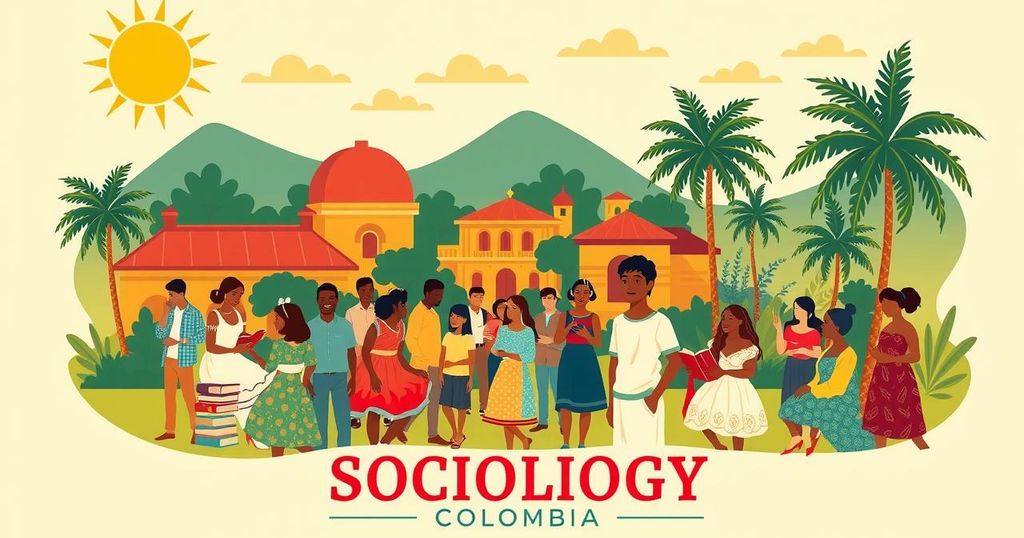In memoriam
BOGOTÁ, CAMILO TORRES RESTREPO, COLOMBIA, COMPUTER SCIENCE, CUBA, EDUARDO UMANA LUNA, EDUCATION, LATIN AMERICA, MARÍA CRISTINA SALAZAR, MINISTRY OF AGRICULTURE, NORTH AMERICA, OBITUARY, OF, ORLANDO FALS BORDA, RECOGNITION, SOUTH AMERICA, STUDENTS, UNITED STATES, UNIVERSITY, UNIVERSITY OF FLORIDA, VERED
Isaac Bennett
0 Comments
Honoring the Legacy of Orlando Fals Borda in Sociology
- Orlando Fals Borda is regarded as the father of sociology in Colombia.
- This centennial marks a significant tribute to his contributions to social thought.
- He founded the first Faculty of Sociology in Latin America at the National University of Colombia.
- Fals Borda developed Participatory Action Research, incorporating communities in the research process.
- His seminal works addressed the intersections of violence and social transformation in Colombia.
Commemorating a Pioneer of Colombian Sociology is vital.
Honoring the Legacy of Orlando Fals Borda in Sociology
Early Academic Contributions to National Sociology in Colombia
Born on July 11, 1925, in Barranquilla, Orlando Fals Borda carved a niche for himself in the realm of sociology, marking a hundred years since his birth this year. After completing his undergraduate studies in English Literature and History at the University of Dubuque in Iowa, he continued his academic journey in sociology, earning both a master’s degree and a doctoral degree focused on Latin American Sociology from prestigious institutions. This education laid the groundwork for his groundbreaking work, particularly in qualitative methodology, which he began developing during field research in rural Colombia and culminated in influential publications like ‘Campesinos de los Andes.’ Upon returning to Colombia, he moved into significant roles, including Directorship at the Ministry of Agriculture, which allowed him to marry state functions with a strong social conscience.
Addressing Violence and Social Change Through Scholarly Work
In 1959, Fals Borda, with colleagues Camilo Torres Restrepo and others, founded Latin America’s initial Faculty of Sociology at the National University of Colombia. Serving as dean until 1967, he helped shape sociology in Colombia to respond to national realities, addressing pressing issues like violence and migration during tumultuous times. His establishment of the first graduate program focusing on the Sociology of Education, PLEDES, exemplified his deep commitment to intertwining sociological theory with the complexities of Colombian society. Besides, he created the Participatory Action Research (PAR) method, revolutionizing how researchers interact with communities, integrating them actively into the knowledge process rather than treating them solely as subjects of study.
A Lasting Resounding Influence in Today’s Colombia
Fals Borda’s impact on the social fabric becomes particularly evident in seminal texts like ‘La violencia en Colombia’, a critical examination of violence published in the early ‘60s alongside his collaborators. This groundbreaking work did not shy away from challenging the powerful elite, earning it both historic acclaim and controversy. Following the death of his friend Camilo Torres, Fals Borda shifted gears in his writings towards a more explicit advocacy for social change, recognizing the role of sociology in challenging systemic injustices as demonstrated in ‘La subversión en Colombia: el cambio social en la historia.’ His ceaseless dedication led to monumental works such as ‘Historia de la cuestión agraria en Colombia’ and ‘Historia doble de la Costa,’ which have become touchstones in understanding Colombia’s complex social dynamics.
Reflections on Fals Borda’s Irreplaceable Legacy
As we approach 2025, the centenary year in honor of Fals Borda, Colombia is witnessing a resurgence of interest in his contributions. Various commemorative initiatives, including a law passed by Congress to promote his writings and heritage, show that his work is not only being remembered but actively celebrated. Academic institutions like the University of Atlántico are designating this year to formulate events, seminars and even creating a sculpture in his honor. The recognition extends to the Latin American and Caribbean Conference on Social Sciences, which is devoted to his legacy this year. With ongoing educational initiatives reflecting his theories, Fals Borda’s spirit continues to influence new generations striving for social betterment.
Orlando Fals Borda is far from just a name in the pages of Colombian history; he is a foundational figure of sociology whose life and work continue to inspire new discourse. His commitment to intertwining research with activism, combined with a deep understanding of societal issues, forms a powerful lesson in the importance of sociology as an agent for change. As Colombia navigates through its complex realities, Fals Borda’s principles remain a guiding light, encouraging a collective approach to knowledge that prioritizes community empowerment and social transformation.




Post Comment